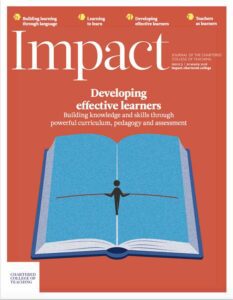Putting the ‘feed’ in feedback

Put diesel fuel in the tank of a diesel car, and the cogs and pistons smoothly tick. Put petrol in a diesel engine – the mechanics cease to run smoothly, and problems begin to develop. Feedback can have the same effect – it can either power your students’ learning journey or leave them liable to stall. So, what are the potential benefits and possible limitations of feedback?
When feedback does what it is meant to do (be it written, verbal or part of a peer critique), errors in student work decrease, planning is clearly informed and the once-tangled ball of skills and knowledge begins to unravel. Is there a secret in closing a flailing feedback black hole and building a fortress of achievement? I conclude a resounding no. In the feedback strand of their online Teaching and Learning Toolkit (Education Endowment Foundation , 2018), the Education Endowment Foundation highlights the importance of understanding the ‘potential benefits’ and the ‘possible limitations of feedback as a teaching and learning approach.’ Challenge is emphasised alongside effort and perseverance. As a reflective practitioner, this emphasis focused my thinking around the long-standing debate of knowledge and skills – both have to be part of a student’s toolkit if feedback is to be useful.
After taking a step back and soaking up the reaction to feedback in my classroom, it was clear that my students lacked the independent skills to effectively engage with my written comments to drive their learning. I had believed my feedback to be ‘specific and clear’. It was objective-focused, but flat – there was something missing to make the learning last for miles. If feedback is to work in the classroom, students have to understand how to access and apply it and, in turn, show a growth in their understanding. To achieve this, students must be armed with the right tools. Otherwise, like the petrol filled diesel engine, their learning may grind to a halt.
Soderstrom and Bjork (Soderstrom and Bjork, 2015) argue that instruction should ‘facilitate life-long learning’ and ‘make permanent changes in understanding and skills, supporting long-term retention and transfer’ (p. 23). My students relied on my feedback, yet they kept making the same mistakes. Asking students to expand on their answers was insufficient. Many times, I have advised students to develop their answers through their analysis of a character or improve their ideas around writers’ methods. If you don’t know how, you can’t. Giving the same feedback repeatedly is like giving yourself a punishment of writing lines! Pointing out a missing assessment objective in a mark scheme wasn’t helping my students. I realised that, to encourage student independence, my feedback had to be a strategy, involving activities that nurtured retention and transferThe processes of applying learning to new situations More.
I concluded that my feedback had to take out the ‘finished article’. For ten years, I was a member of a rowing squad and we never watched a race over and over again from start to finish. We concentrated on the specific skills that would improve an aspect of the final performance. Dylan Wiliam (Wiliam, 2011) describes this as a ‘recipe for future action’, and concludes that activities should move individuals from ‘their current state to the goal state’ (p.120). Gone are my repetitive feedback statements. Now, after research and reflection, my feedback identifies the skills required to meet particular assessment criteria — the jigsaw pieces of the overall objective. A process of questioning, reactive teaching and specific skill-related modelling supports my students towards independence.
Engaging with research and reflecting on classroom pedagogy has changed my approach to feedback. As a result, rather than going around in circles, feedback is helping my students drive towards their learning goals.










